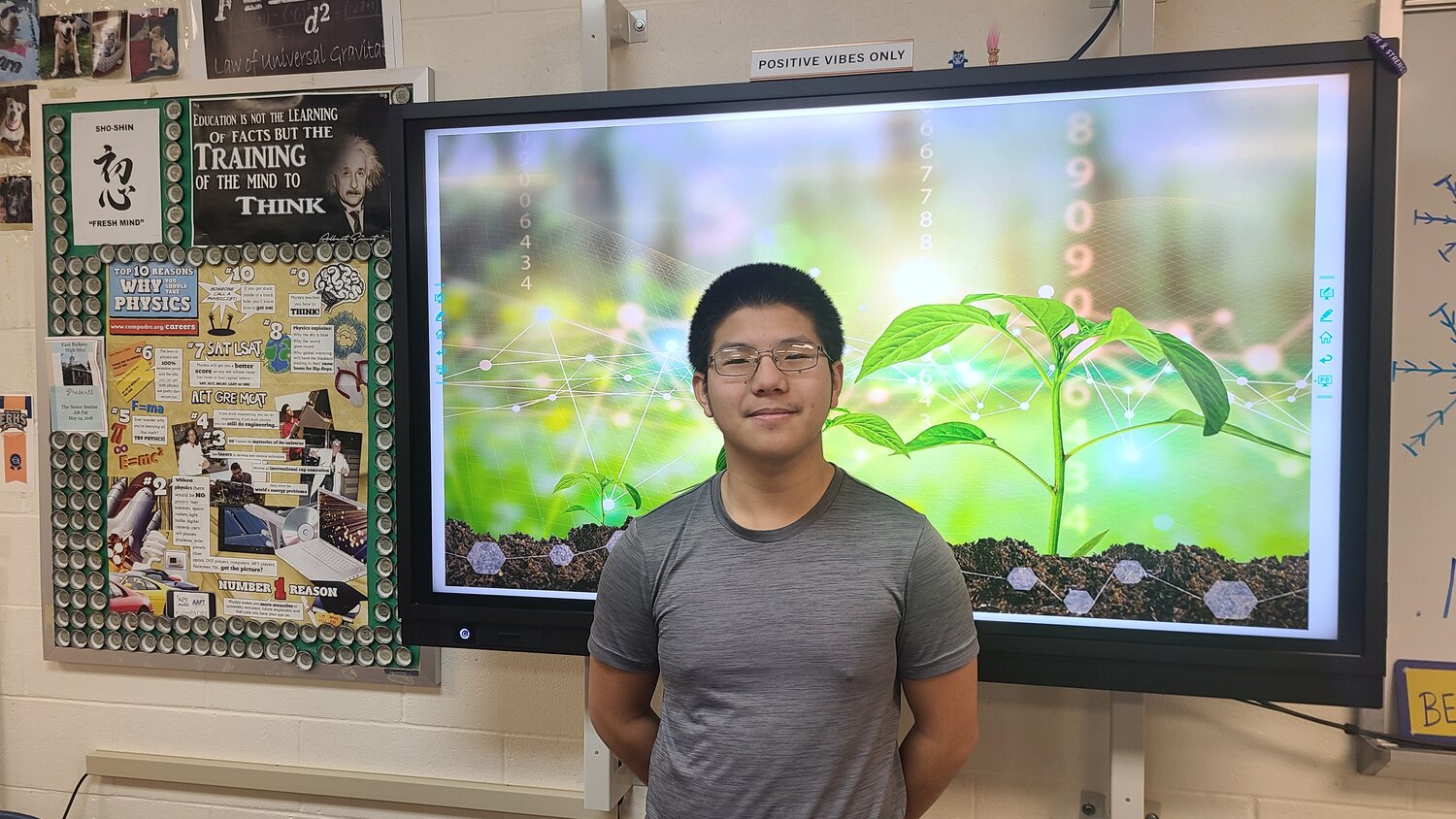Tuesday, June 18, 2024
Andrew Chen’s science project: out of this world

Andrew Chen, a sophomore at East Rockaway Jr./Sr. High School, has determined how to help astronauts stay in space longer earning him second place at NASA’s Growing Beyond Earth science research competition.
The symposium, which took place on April 20, was a classroom-based science competition led by NASA and designed to advance research on growing plants in space. This is East Rockaway School District’s first year in the program. Chen submitted a research proposal to the competition where he talked about the effects of elevated CO2 concentrations on the germination rate of Eruca Sativa, also called astro arugula.
Chen’s research aimed to solve the problem of processing and storing fresh food for extended space missions. He investigated options for growing produce on the International Space Station and Mars.
“The general idea behind the project was imitating a situation that you would find on extra-terrestrial places,” Chen said. “This issue is that I’m here on Earth so I can’t really grow plants in a zero-gravity environment, so I decided to replicate a high CO2 environment because in the ISS, their CO2 percentage ranges around 3 to 4 thousand parts per million.”
Chen studied how a plant would grow in space conditions that are like those on the ISS, which helped him also research how to grow plants in other space conditions.
When Chen started his research in January, he noticed that all the previous research he came across only focused on what the impact of CO2 concentrations from climate change would be on plants. The highest level of CO2 concentration he found was 1,000 ppm. He then started working on his project by creating a box to contain his high CO2 concentrations.
Chen 3D printed the box with the help of his digital fabrication teacher. With the use of dry ice, he was then able to increase the CO2 levels in the box. He said that less than a 10th gram of dry ice got him to 3,000 ppm.
“When I first created the box, I lost around half of the CO2 in the box and that’s why creating the box took the majority of the time with this experiment so that was probably my greatest challenge,” Chen said.
Getting the CO2 was not an easy process for Chen. He wanted to test his research project before the actual presentation with the NASA scientists but could not because his supplier ran out of dry ice. According to Chen, this was one of the major limitations that he faced during his research.
“In conclusion, we found that the increased levels of co2 was actually beneficial to the plants because we found out that the plants germinated a day earlier than usual,” Chen said.
Chen also noted that the germination rate of his research was 33 percent higher than the control experiment.
“Because it’s an international competition, the presentation was actually all done through zoom,” Dame Forbes, science research teacher, said. “So, the students were in different breakout rooms with four scientists in each room and they would listen to the presentations and then ask questions.”
Chen said he was one of the last people in his breakout room to present and after hearing the “really good” presentations from his peers, he expected to not even be close to finishing in the top 10. He noted that he was really surprised to hear that he got second place in this competition, and it was “very exciting.”
Chen believes that his research will have a significant impact on astronauts in space. He explained that astronauts have limitations like how long they can stay in space; and when food is sent up from Earth, they need to be processed to be space-ready by having dust and particles thoroughly removed.
“So having just fresh produce out there would allow for the astronauts to stay in space for longer periods of time because they would get the nutrition that they need,” Chen said. “And they would also most likely enjoy it more because it’s fresh.”
Forbes said it was exciting and rewarding to watch Chen go through the science research process and follow through with a “solid research design.”
“I think one of the things I always like about science research is that we are able to truly inspire a lot of young people to conduct independent research,” Forbes said. “There’s so many opportunities out there and the only limitation is what you can think of.”
Chen said he plans to join more science research courses and competitions in the future.
HELP SUPPORT LOCAL JOURNALISM
The worldwide pandemic has threatened many of the businesses you rely on every day, but don’t let it take away your source for local news. Now more than ever, we need your help to ensure nothing but the best in hyperlocal community journalism comes straight to you. Consider supporting the Herald with a small donation. It can be a one-time, or a monthly contribution, to help ensure we’re here through this crisis. To donate or for more information, click here.
Sponsored content
Other items that may interest you






